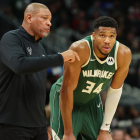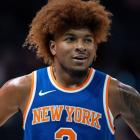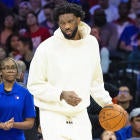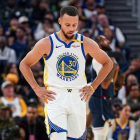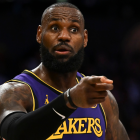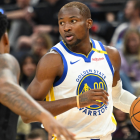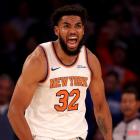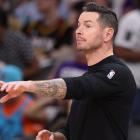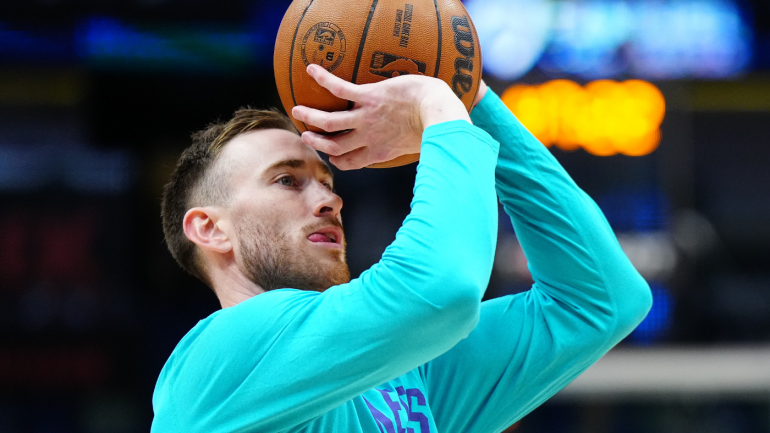
The Oklahoma City Thunder are acquiring former All-Star Gordon Hayward from the Charlotte Hornets for Tre Mann, Vasilije Micic, Davis Bertans and draft compensation, according to The Athletic's Shams Charania. The deal allows Hayward, previously of the Boston Celtics and Utah Jazz, to rejoin a winner after spending the past three-plus seasons on a Charlotte team that hasn't reached the playoffs.
Right now, Hayward is out dealing with a calf injury. Injuries have been a problem for him ever since he signed with the Celtics, but if he can get healthy for the stretch run, he makes a ton of sense for a Thunder team that is making a real push to contend this season.
Hayward is still a high-level shooter and shot-creator. On paper, his skill set is reminiscent of Josh Giddey's, and that gives the Thunder a steadier, veteran hand to turn to in the postseason if Giddey's shaky jump shot or inexperience causes problems for them.
Though he is not a great defender due to his athletic limitations, Hayward is a smart defender who is typically in the right places and can function within a team infrastructure. Health will always be a concern for him, but Hayward has had to play more than 30 minutes per game in each of the past five seasons. The Thunder can carefully monitor his playing time to keep him healthy for the postseason.

CBS Sports HQ Newsletter
Your Ultimate Guide to Every Day in Sports
We bring sports news that matters to your inbox, to help you stay informed and get a winning edge.
Thanks for signing up!
Keep an eye on your inbox.
Sorry!
There was an error processing your subscription.
The motivation for Charlotte is obvious. They are in full asset-collection mode and already traded Terry Rozier earlier this season. While they aren't getting picks back for Hayward, they do get a 2021 first-round pick in Mann who still has some upside. The trouble for Mann in Oklahoma City was that the Thunder have so many good young players due to their mountain of draft assets that he struggled to find a consistent role. That should be less of an issue on a rebuilding Hornets team.
Hayward may not be as good as he was at his peak, but he's likely the most accomplished player who will be traded at the deadline. He's a former All-Star joining a championship contender, so even if he isn't quite his prime self, this is a significant addition to one of the best teams in the Western Conference. Here's how both teams grade in the deal:
Thunder: A
This is a relatively simple calculus. The Thunder gave away nothing from their core rotation and took on no long-term salary. In exchange, they added a player whose style matches an existing starter, only without that starter's debilitating shooting weakness. That makes this trade an easy "A." Yes, Hayward comes with injury concerns, but the Thunder can limit his minutes enough to protect him as much as possible.
Here's the storyline to watch: while Giddey will almost certainly remain a starter, it's entirely possible that the Thunder just traded for Hayward to ensure that Giddey won't have to close games in the playoffs. Isaiah Joe has already played more clutch minutes than Giddey this season, and Kenrich Williams, Cason Wallace and Aaron Wiggins have all gotten fair shots as well. In Hayward, the Thunder now have a player who brings many of the same strengths as Giddey, but without that shooting weakness. In the process, they've added a player with more playoff experience than the rest of their starting lineup combined. If Hayward is a typical reserve? This is a win. If he's a playoff closer and the Thunder got him for effectively nothing? This is one of the best trades of the deadline.
Hornets: A
Yeah, that's right, we're giving an "A" to both sides here. This is an easy win-win trade. Hayward is making $31.5 million this season. How many contenders have $31.5 million in matching salary for a 33-year-old who is rarely healthy? It looked like Hayward was going to have to get bought out to land with a winner this season. Instead, the Hornets actually got something for him.
Mann was blocked from a consistent role by Oklahoma City's depth. With Shai Gilgeous-Alexander, Lu Dort, Isaiah Joe and Cason Wallace in front of him, there was just nothing Mann could have done to prove he belonged in Oklahoma City. But he started 26 games as a rookie and largely played well, averaging 10.4 points per game. The Hornets actually have the playing time available to explore his upside. Even if he turns into a viable long-term backup, getting him for a player they were going to lose anyway qualifies as an easy win.









